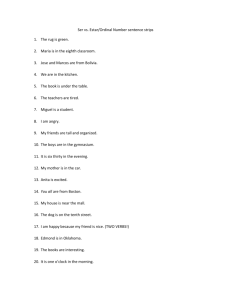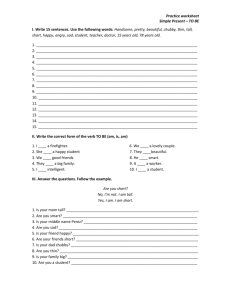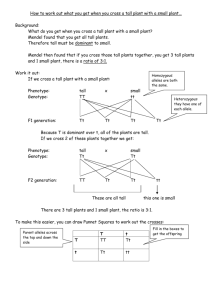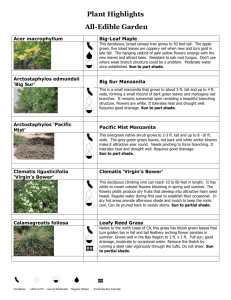California Native plants for Inland Gardens
advertisement
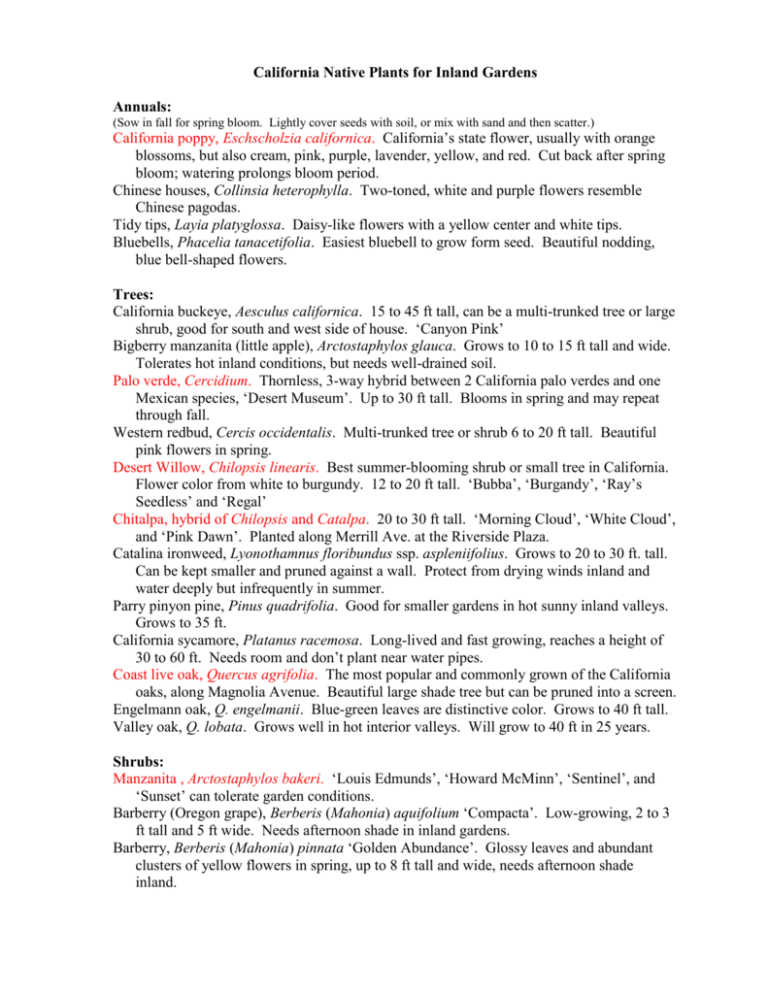
California Native Plants for Inland Gardens Annuals: (Sow in fall for spring bloom. Lightly cover seeds with soil, or mix with sand and then scatter.) California poppy, Eschscholzia californica. California’s state flower, usually with orange blossoms, but also cream, pink, purple, lavender, yellow, and red. Cut back after spring bloom; watering prolongs bloom period. Chinese houses, Collinsia heterophylla. Two-toned, white and purple flowers resemble Chinese pagodas. Tidy tips, Layia platyglossa. Daisy-like flowers with a yellow center and white tips. Bluebells, Phacelia tanacetifolia. Easiest bluebell to grow form seed. Beautiful nodding, blue bell-shaped flowers. Trees: California buckeye, Aesculus californica. 15 to 45 ft tall, can be a multi-trunked tree or large shrub, good for south and west side of house. ‘Canyon Pink’ Bigberry manzanita (little apple), Arctostaphylos glauca. Grows to 10 to 15 ft tall and wide. Tolerates hot inland conditions, but needs well-drained soil. Palo verde, Cercidium. Thornless, 3-way hybrid between 2 California palo verdes and one Mexican species, ‘Desert Museum’. Up to 30 ft tall. Blooms in spring and may repeat through fall. Western redbud, Cercis occidentalis. Multi-trunked tree or shrub 6 to 20 ft tall. Beautiful pink flowers in spring. Desert Willow, Chilopsis linearis. Best summer-blooming shrub or small tree in California. Flower color from white to burgundy. 12 to 20 ft tall. ‘Bubba’, ‘Burgandy’, ‘Ray’s Seedless’ and ‘Regal’ Chitalpa, hybrid of Chilopsis and Catalpa. 20 to 30 ft tall. ‘Morning Cloud’, ‘White Cloud’, and ‘Pink Dawn’. Planted along Merrill Ave. at the Riverside Plaza. Catalina ironweed, Lyonothamnus floribundus ssp. aspleniifolius. Grows to 20 to 30 ft. tall. Can be kept smaller and pruned against a wall. Protect from drying winds inland and water deeply but infrequently in summer. Parry pinyon pine, Pinus quadrifolia. Good for smaller gardens in hot sunny inland valleys. Grows to 35 ft. California sycamore, Platanus racemosa. Long-lived and fast growing, reaches a height of 30 to 60 ft. Needs room and don’t plant near water pipes. Coast live oak, Quercus agrifolia. The most popular and commonly grown of the California oaks, along Magnolia Avenue. Beautiful large shade tree but can be pruned into a screen. Engelmann oak, Q. engelmanii. Blue-green leaves are distinctive color. Grows to 40 ft tall. Valley oak, Q. lobata. Grows well in hot interior valleys. Will grow to 40 ft in 25 years. Shrubs: Manzanita , Arctostaphylos bakeri. ‘Louis Edmunds’, ‘Howard McMinn’, ‘Sentinel’, and ‘Sunset’ can tolerate garden conditions. Barberry (Oregon grape), Berberis (Mahonia) aquifolium ‘Compacta’. Low-growing, 2 to 3 ft tall and 5 ft wide. Needs afternoon shade in inland gardens. Barberry, Berberis (Mahonia) pinnata ‘Golden Abundance’. Glossy leaves and abundant clusters of yellow flowers in spring, up to 8 ft tall and wide, needs afternoon shade inland. 2 Shrubs continued: California lilac, Ceonothus. ‘Ray Hartman’ can get 18 ft tall and wide, ‘Concha’ and ‘Louis Edmunds’ are good mid-sized cultivars (8 ft tall and wide. All need some afternoon shade and careful watering in summer. Toyon (Hollywood), Heteromeles arbutifolia. Easy to grow with abundant red berries in winter. Can be grown as a large shrub (8 to 15 ft tall) or pruned into a multi-trunked tree. ‘Davis Gold’ has yellow berries. Bladderpod, Isomeris arborea. Easy to grow, not more than 6 ft tall. Blue-gray foliage, with yellow flowers and odd inflated fruit. Heaviest bloom in spring; flowers attract hummingbirds. Perennials: California fuschia, Epilobium (Zauschneria) species. Red and orange blooms in late summer and fall. Hummingbirds love them. Can be invasive in the garden. Good on slopes and in dry stream beds. Cultivars range in height from 4 inches to 2 ft tall. Buckwheat, Eriogonum species. More than 125 species of buckwheat native to California, ranging in size from tiny annuals to 8-ft shrubs. Often very sculptural in form and with long bloom periods. Red-flowered buckwheat (E. grande var. rubescens) and sulphur buckwheat (E. umbellatum var. polyanthum ‘Shasta Sulphur’) form low mounds and Saint Catherine’s lace (E. giganteum) grows to 6 ft. Coral bells, Heuchera species. Need partial shade in inland gardens. Low, mounding plants with pink flowers on stalks up to 1.5 ft tall. ‘Canyon Delight’ ‘Canyon Pink’ Scarlet coral bells from Arizona works well in inland gardens. Shrubby monkey flower, Mimulus aurantiacus. Profuse bloomers, work well in the garden and in containers; may be short-lived (2 to 5 years). Grow to 3 ft tall and 3 ft wide. ‘Burgandy’ long-lived and deep red, ‘Eleanor’ long-lived and yellow. Scarlet bugler, Penstemon centranthifolius. Brilliant red flowers spring to summer; grows to 4 ft tall in bloom. Can be grown in containers. Foothill penstemon, Penstemon heterophyllus ‘Margarita BOP’. Widely grown and can tolerate heavy soils and summer water. Grows 2 ft tall. ‘Margarita BOP’ is most reliable variety that blooms for several months. Matilija poppy, Rhomneya coulteri. Very showy “fried-egg” flowers in the spring. Stems grow to 10 ft tall. Difficult to establish, and once established, hard to contain. Needs large area to sprawl. White sage, Salvia apiana. Silvery white foliage on a plant that grows 2.5 ft tall and 4 ft across. Flower stalks of pink-tinged white flowers add 3 ft more in height. Needs no summer water. Cleveland sage, Salvia clevelandii. The best-scented sage with a more refined appearance than white sage. Grows 3 to 5 ft tall and wide. Whorls of vivid blue flowers on long flowering stalks. ‘Winifred Gilman’ Purple sage, Salvia leucophylla. Easy-to-grow native sage. Light rosy pink flowers. Good plant on hills for erosion control. Grows to 4 ft or more and up to 10 ft wide. Lower varieties are ‘Point Sal Spreader’ or ‘Jade Treasure’. Needs good drainage. Verbena, Verbena lilicina ‘de la Mina’. From Baja California. 3 ft tall and wide. Lacy foliage with pink/purple flowers. Adaptable to many garden conditions, with long bloom season. Good for containers. Giant chain fern, Woodwardia fimbriata. Fronds grow to 6 ft tall. Needs afternoon shade in inland gardens. 3 Ground covers: Manzanita, Arctostaphylos edmundsii. Very tolerant of garden conditions. ‘Bert Johnson’ grows 2 ft tall and 5 ft wide. ‘Carmel Sur’ grows 1.5 ft tall and 6 ft wide. California lilac, Ceonothus ‘Yankee Point’. Low-growing with small leaves and beautiful spring bloom. Typically 2 ft tall with a 10-ft spread. Tolerates interior conditions. Poverty weed, Iva hayesiana. Tough low-spreading plant, useful for its tolerance of many garden situations, for erosion control on slopes, and low maintenance. Silver carpet California aster, Lessengia filaginifolia ‘Silver Carpet’. Spreading plant with silvery foliage, low growth, and long flowering period throughout summer. Host plant for many butterflies. Hummingbird sage, Salvia spathacea. Low-growing and grows well in dry shade. One to 3 ft tall and the only red-flowered native sage. Grows well in a container. Sage, Salvia “Bee’s Bliss’. Outstanding light gray groundcover with blue flowers on 1-ft stalks. Creeping barberry, Berberis (Mahonia) repens. 1 ft tall by 3 ft wide. Needs afternoon shade inland. Grasses: (Warm-season grasses grow and bloom in the warm months and are dormant in the winter. Cool-season grasses grow and bloom in the cool winter and early spring and are dormant in the summer.) Purple three-awn grass, Aristida purpurea var. purpurea. Good color and year-round beauty, delicate stems and burgundy seed heads. Warm-season. California fescue, Festuca californica. Forms a large clump up to 2-ft tall, with flower stems to 4 ft. Cool-season. Idaho fescue, Festuca idahoensis. Gray-green foliage in 1 to 2 ft clumps. Cool season. Gramma grass, Bouteloua curtipendula (side-oats gramma), B. gracilis (blue gramma). Both can be used for turf or as ornamentals and are very drought tolerant. Warm season. Canyon Prince wild rye, Leymus condensatus. Icy blue foliage, can be used as accent or in large groupings of grasses. ‘Canyon Prince’ has a compact habit and may reach 5 ft in bloom. Full sun increases the intensity of the blue. Cool season. Deer grass, Muhlenbergia rigens. Large grass up to 5 ft tall and wide; can be grown as a single specimen or in groups. Needs little grooming and looks good year around. Warmseason. Needle grass, Nasella species. Grow up to 3 ft tall, with narrow leaves that turn brown in summer. Purple needle grass (N. pulchra) is the state grass of California and has delicate structure and is very drought-tolerant. Cool season. Vines Wild grape, Vitis californica ‘Rogers Red’. Good plant for fall foliage even in mild climates. Can be trained on a trellis or as a ground cover. Grapes are small but good for wildlife.

